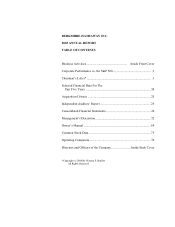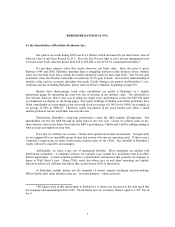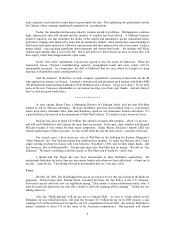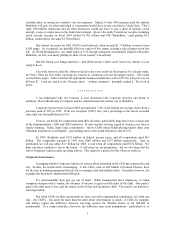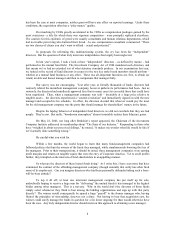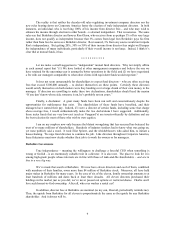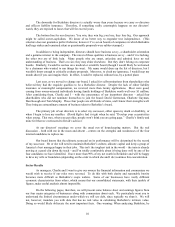Berkshire Hathaway 2003 Annual Report Download - page 8
Download and view the complete annual report
Please find page 8 of the 2003 Berkshire Hathaway annual report below. You can navigate through the pages in the report by either clicking on the pages listed below, or by using the keyword search tool below to find specific information within the annual report.7
certainly place us among our country’ s top ten taxpayers. Indeed, if only 540 taxpayers paid the amount
Berkshire will pay, no other individual or corporation would have to pay anything to Uncle Sam. That’ s
right: 290 million Americans and all other businesses would not have to pay a dime in income, social
security, excise or estate taxes to the federal government. (Here’ s the math: Federal tax receipts, including
social security receipts, in fiscal 2003 totaled $1.782 trillion and 540 “Berkshires,” each paying $3.3
billion, would deliver the same $1.782 trillion.)
Our federal tax return for 2002 (2003 is not finalized), when we paid $1.75 billion, covered a mere
8,905 pages. As is required, we dutifully filed two copies of this return, creating a pile of paper seven feet
tall. At World Headquarters, our small band of 15.8, though exhausted, momentarily flushed with pride:
Berkshire, we felt, was surely pulling its share of our country’ s fiscal load.
But Ms. Olson sees things otherwise. And if that means Charlie and I need to try harder, we are
ready to do so.
I do wish, however, that Ms. Olson would give me some credit for the progress I’ ve already made.
In 1944, I filed my first 1040, reporting my income as a thirteen-year-old newspaper carrier. The return
covered three pages. After I claimed the appropriate business deductions, such as $35 for a bicycle, my tax
bill was $7. I sent my check to the Treasury and it – without comment – promptly cashed it. We lived in
peace.
* * * * * * * * * * * *
I can understand why the Treasury is now frustrated with Corporate America and prone to
outbursts. But it should look to Congress and the Administration for redress, not to Berkshire.
Corporate income taxes in fiscal 2003 accounted for 7.4% of all federal tax receipts, down from a
post-war peak of 32% in 1952. With one exception (1983), last year’ s percentage is the lowest recorded
since data was first published in 1934.
Even so, tax breaks for corporations (and their investors, particularly large ones) were a major part
of the Administration’ s 2002 and 2003 initiatives. If class warfare is being waged in America, my class is
clearly winning. Today, many large corporations – run by CEOs whose fiddle-playing talents make your
Chairman look like he is all thumbs – pay nothing close to the stated federal tax rate of 35%.
In 1985, Berkshire paid $132 million in federal income taxes, and all corporations paid $61
billion. The comparable amounts in 1995 were $286 million and $157 billion respectively. And, as
mentioned, we will pay about $3.3 billion for 2003, a year when all corporations paid $132 billion. We
hope our taxes continue to rise in the future – it will mean we are prospering – but we also hope that the
rest of Corporate America antes up along with us. This might be a project for Ms. Olson to work on.
Corporate Governance
In judging whether Corporate America is serious about reforming itself, CEO pay remains the acid
test. To date, the results aren’ t encouraging. A few CEOs, such as Jeff Immelt of General Electric, have
led the way in initiating programs that are fair to managers and shareholders alike. Generally, however, his
example has been more admired than followed.
It’ s understandable how pay got out of hand. When management hires employees, or when
companies bargain with a vendor, the intensity of interest is equal on both sides of the table. One party’ s
gain is the other party’ s loss, and the money involved has real meaning to both. The result is an honest-to-
God negotiation.
But when CEOs (or their representatives) have met with compensation committees, too often one
side – the CEO’ s – has cared far more than the other about what bargain is struck. A CEO, for example,
will always regard the difference between receiving options for 100,000 shares or for 500,000 as
monumental. To a comp committee, however, the difference may seem unimportant – particularly if, as

